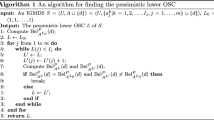Abstract
In order to establish a better application platform for granular computing, a novel generalized granulation model based on characteristic similarity is constructed in this paper. Considering that in the real-world application, a decision table often contains large amount of different types of complex data, we firstly reform these complex data into unified mathematical descriptions under the probabilistic measures. Then, characteristic similarity relation based on calculations of expectation and variance values, is figured to measure the similarity of each pair of objects with multi-complex attribute values. Lastly, we can get granulation results for all objects in the decision table according to the definition of characteristic similarity matrix. It has been proved that the proposed granulation model is a reasonable extension of Pawlaks equivalence partition model. Finally, examples are given to illustrate the proposed granulation model, which is proved to be effective, feasible and simple.
Access this chapter
Tax calculation will be finalised at checkout
Purchases are for personal use only
Preview
Unable to display preview. Download preview PDF.
Similar content being viewed by others
References
Pedrycz, W.: Granular computing-the emerging paradigm. Journal of Uncertain Systems 1, 38–61 (2007)
Jenson, R., Shen, Q.: Granular computing-the emerging paradigm. Journal of Uncertain Systems. In: Proceedings of IEEE International Conference on Fuzzy Systems, pp. 29–34. IEEE Press, New York (2002)
Ma, J.M., Zhang, W.X., Leung, Y.: Granular computing and dual Galois connection. Information Sciences 177, 5365–5377 (2007)
Bhatt, R.B., Gopal, M.: On the extension of functional dependency degree from crisp to fuzzy partitions. Pattern Recognition Letters 27, 487–491 (2006)
Zhu, W.: Topological approaches to covering rough sets. Information Sciences 177, 1499–1508 (2007)
Hedjazi, L., Aguilar-Martin, J., Lann, M.L.: Similarity-margin based feature selection for symbolic interval data. Pattern Recognition Letters 32, 578–585 (2011)
Qian, Y., Dang, C., Liang, J.: Set-valued ordered information systems. Information Sciences 179, 2809–2832 (2009)
Wu, W.Z., Zhang, M., Li, H.Z.: Knowledge reduction in random information systems via Dempster-Shafer theory of evidence. Information Sciences 174, 143–164 (2005)
Hu, Q.H., Zhang, L., Zhang, D.: Measuring relevance between discrete and continuous features based on neighborhood mutual information. Expert Systems with Applications 38, 10737–10750 (2011)
Tan, X., Tang, Y.L., Zhang, S.D.: Rough sets based attribute reduction algorithm for hybrid data. Journal of National Univ. of Defense Technology 30, 83–88 (2008) (in Chinese)
Tan, X.: Extended rough set models and their applications in quality prediction and evaluation for tobacco leaves. National University of Defense Technology, Changsha (2009)
Author information
Authors and Affiliations
Editor information
Editors and Affiliations
Rights and permissions
Copyright information
© 2012 Springer-Verlag Berlin Heidelberg
About this paper
Cite this paper
Tan, X., Chen, B. (2012). Generalized Granulation Model for Data with Multi-complex Values. In: Yao, J., et al. Rough Sets and Current Trends in Computing. RSCTC 2012. Lecture Notes in Computer Science(), vol 7413. Springer, Berlin, Heidelberg. https://doi.org/10.1007/978-3-642-32115-3_48
Download citation
DOI: https://doi.org/10.1007/978-3-642-32115-3_48
Publisher Name: Springer, Berlin, Heidelberg
Print ISBN: 978-3-642-32114-6
Online ISBN: 978-3-642-32115-3
eBook Packages: Computer ScienceComputer Science (R0)




